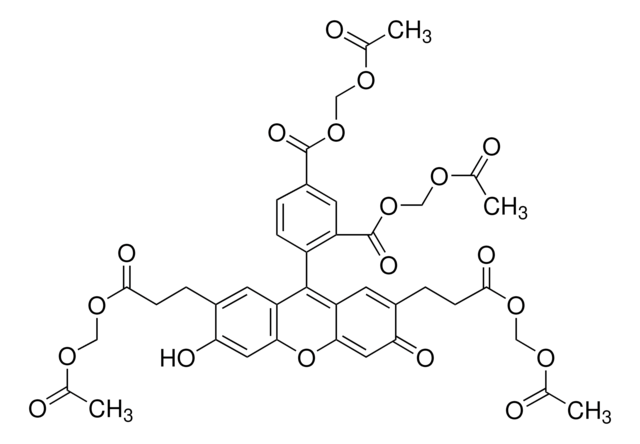21879
5(6)-Carboxyfluorescein diacetate
BioReagent, suitable for fluorescence, ≥90.0% (HPLC)
Synonym(s):
5(6)-Carboxy-di-O-acetylfluorescein
About This Item
Recommended Products
product line
BioReagent
Assay
≥90.0% (HPLC)
form
powder
solubility
DMSO: soluble
fluorescence
λex 492 nm; λem 517 nm in 0.1 M Tris pH 8.0 (esterase)
suitability
suitable for fluorescence
storage temp.
2-8°C
SMILES string
CC(=O)Oc1ccc2c(Oc3cc(OC(C)=O)ccc3C24OC(=O)c5ccc(cc45)C(O)=O)c1.CC(=O)Oc6ccc7c(Oc8cc(OC(C)=O)ccc8C79OC(=O)c%10cccc(C(O)=O)c9%10)c6
InChI
1S/2C25H16O9/c1-12(26)31-15-4-7-18-21(10-15)33-22-11-16(32-13(2)27)5-8-19(22)25(18)20-9-14(23(28)29)3-6-17(20)24(30)34-25;1-12(26)31-14-6-8-18-20(10-14)33-21-11-15(32-13(2)27)7-9-19(21)25(18)22-16(23(28)29)4-3-5-17(22)24(30)34-25/h2*3-11H,1-2H3,(H,28,29)
InChI key
SWRGCNMDGRMQGB-UHFFFAOYSA-N
General description
Application
5(6)- Carboxyfluorescein diacetate (CFDA) is a viability probe that assesses enzymatic activity, which is necessary to activate its fluorescence, and cell-membrane integrity, which is necessary for the retention of their fluorescent product within the cell.
Storage Class Code
11 - Combustible Solids
WGK
WGK 3
Flash Point(F)
Not applicable
Flash Point(C)
Not applicable
Personal Protective Equipment
Certificates of Analysis (COA)
Search for Certificates of Analysis (COA) by entering the products Lot/Batch Number. Lot and Batch Numbers can be found on a product’s label following the words ‘Lot’ or ‘Batch’.
Already Own This Product?
Find documentation for the products that you have recently purchased in the Document Library.
Customers Also Viewed
Articles
Nitric oxide (NO) as a signal transporter in neurons, endothelial cells and in the immune system.
Our team of scientists has experience in all areas of research including Life Science, Material Science, Chemical Synthesis, Chromatography, Analytical and many others.
Contact Technical Service













